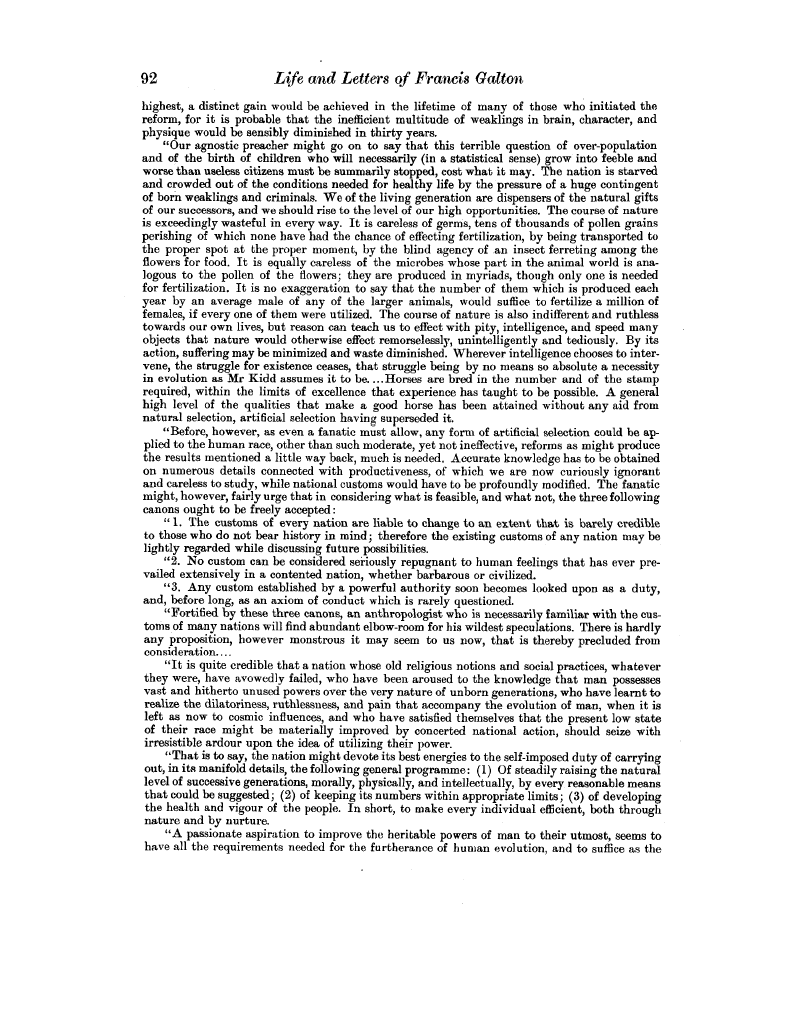| ||||||

OCR Rendition - approximate
92 Life and Letters of Francis Galton highest, a distinct gain would be achieved in the lifetime of many of those who initiated the reform, for it is probable that the inefficient multitude of weaklings in brain, character, and physique would be sensibly diminished in thirty years. "Our agnostic preacher might go on to say that this terrible question of over-population and of the birth of children who will necessarily (in a statistical sense) grow into feeble and worse than useless citizens must be summarily stopped, cost what it may. The nation is starved and crowded out of the conditions needed for healthy life by the pressure of a huge contingent of born weaklings and criminals. We of the living generation are dispensers of the natural gifts of our successors, and we should rise to the level of our high opportunities. The course of nature is exceedingly wasteful in every way. It is careless of germs, tens of thousands of pollen grains perishing of which none have had the chance of effecting fertilization, by being transported to the proper spot at the proper moment, by the blind agency of an insect ferreting among the flowers for food. It is equally careless of the microbes whose part in the animal world is analogous to the pollen of the flowers; they are produced in myriads, though only one is needed for fertilization. It is no exaggeration to say that the number of them which is produced each year by an average male of any of the larger animals, would suffice to fertilize a million of females, if every one of them were utilized. The course of nature is also indifferent and ruthless towards our own lives, but reason can teach us to effect with pity, intelligence, and speed many objects that nature would otherwise effect remorselessly, unintelligently and tediously. By its action, suffering may be minimized and waste diminished. Wherever intelligence chooses to intervene, the struggle for existence ceases, that struggle being by no means so absolute a necessity in evolution as Mr Kidd assumes it to be....Horses are bred in the number and of the stamp required, within the limits of excellence that experience has taught to be possible. A general high level of the qualities that make a good horse has been attained without any aid from natural selection, artificial selection having superseded it. "Before, however, as even a fanatic must allow, any form of artificial selection could be applied to the human race, other than such moderate, yet not ineffective, reforms as might produce the results mentioned a little way back, much is needed. Accurate knowledge has to be obtained on numerous details connected with productiveness, of which we are now curiously ignorant and careless to study, while national customs would have to be profoundly modified. The fanatic might, however, fairly urge that in considering what is feasible, and what not, the three following canons ought to be freely accepted " 1. The customs of every nation are liable to change to an extent that is barely credible to those who do not bear history in mind; therefore the existing customs of any nation may be lightly regarded while discussing future possibilities. "2. No custom can be considered seriously repugnant to human feelings that has ever prevailed extensively in a contented nation, whether barbarous or civilized. "3. Any custom established by a powerful authority soon becomes looked upon as a duty, and, before long, as an axiom of conduct which is rarely questioned. "Fortified by these three canons, an anthropologist who is necessarily familiar with the customs of many nations will find abundant elbow-room for his wildest speculations. There is hardly any proposition, however monstrous it may seem to us now, that is thereby precluded from consideration.... "It is quite credible that a nation whose old religious notions and social practices, whatever they were, have avowedly failed, who have been aroused to the knowledge that man possesses vast and hitherto unused powers over the very nature of unborn generations, who have learnt to realize the dilatoriness, ruthlessness, and pain that accompany the evolution of man, when it is left as now to cosmic influences, and who have satisfied themselves that the present low state of their race might be materially improved by concerted national action, should seize with irresistible ardour upon the idea of utilizing their power. "That is to say, the nation might devote its best energies to the self-imposed duty of carrying out, in its manifold details, the following general programme: (1) Of steadily raising the natural level of successive generations, morally, physically, and intellectually, by every reasonable means that could be suggested; (2) of keeping its numbers within appropriate limits; (3) of developing the health and vigour of the people. In short, to make every individual efficient, both through nature and by nurture. "A passionate aspiration to improve the heritable powers of man to their utmost, seems to have all the requirements needed for the furtherance of human evolution, and to suffice as the
|